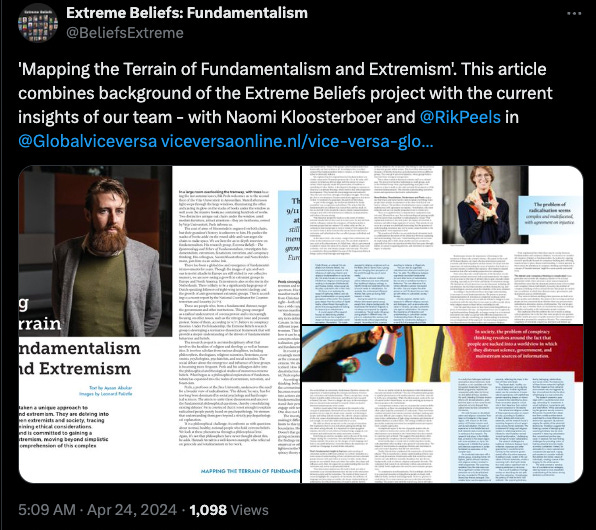Mapping the Terrain of Fundamentalism and Extremism
New article on the Extreme Beliefs Research Group highlights key findings: extremists are normal, surprising kindness, family, belonging, relationships, and social circles play critical roles in derad
The Spring 2024 print edition of Vice Versa ran a great piece summarizing the work of our research group on defining Fundamentalism and Extremism and featured my work. I am grateful to Ayaan Abukar for sitting with me in an interview in the fall of 2023. Here’s what she wrote:
“In a study that challenges traditional assumptions about extremism Scott Gustafson a PhD with the extreme beliefs programme explores the unexpected pains taken by former Isis and Jabahat al-Nusra members. His work, blending Christian mission efforts with de-radicalisation, peels back the layers on how some former extremists not only dropped their radical views but also converted to Christianity. His work focuses on de-radicalisation and religious conversion from Islam to Christianity in the Levant with a focus on the intersection of Christian mission work and de-radicalisation.
Several key themes emerged. Precarity… the supernatural… mutual transformation… surprising kindness, family, belonging, relationships, and social circles.
His years of experience in the Middle East and built networks were crucial elements in working on this research. It took place in the Middle East, primarily in the Levant region with some emphasis on Syria. His background in Middle East studies and extensive experience in Jordan facilitated his exploration of this complex topic.
He conducted interviews with a diverse group, including former ISIS fighters, Jabhat al-Nusra members and religious workers involved in relief programmes.

The surprising revelation from the interviews was that a significant number of former extremists not only de-radicalised but also converted to Christianity.
Several key themes emerged. One notable factor was the experience of precarity, reflecting the chaos in the lives of these individuals. They faced death, hostility, violence, displacement and a decline in social status. Another significant aspect was the prevalence of super-natural experiences, with 83% reporting dreams or visions. These encounters played a crucial role in their departure from radicalism and conversion to Christianity.
The cultural and religious context of these experiences plays an important role, according to Gustafson. In Islam dreams and visions are esteemed and the research found surprising frequency of such experiences among former extremists. The involvement of clergy and religious workers in relief programmes contributed to what Gustafson termed ‘mutual transformation’ challenging the concept of mutual radicalisation.
Harsh retaliation rarely plays a significant role in reducing extremism or terrorism.
The research challenges the traditional dichotomy between hard militaristic responses and softer approaches in counterterrorism. Contrary to the instinctive governmental reflex of punitive measures, Gustafsons study, rooted in the narratives of former extremists, unveils a surprising truth - that harsh retaliation rarely plays a significant role in reducing extremism or terrorism.
The crux of Gustafson's findings centres on describing the exit pathways from extremism. It emphasises the potency of what he terms soft methods: like surprising kindness, family, belonging, relationships, and social circles.
The testimonies of these forrmer extremists highlight that their departure from extremist environments was not triggered by fear of punishment but by the allure of belonging to a new community. The research represents a paradigm shift in counterterrorism strategy, advocating for investments in social institutions, humanitarian aid, and relief efforts. While acknowledging the genuine securtiy concerns that persist, he posits that a departure from a solely punitive stance could lead to a more effective countererterrorism approach.
By acknowledging the validity of the extremists' testimonies, Gustafson suggests that fostering a sense of belonging and surprising kindness, may be more impactful in deterring radicalisation than conventional punitive measures.
the main finding challenges the prevailing notion of treating extremist terrorists merely as enemy combatants… we instead need a more nuanced and compassionate approach.
In essence, the main finding challenges the prevailing notion of treating extremist terrorists merely as enemy combatants. Instead he advocates for a more nuanced and compassionate approach, urging policymakers to consider methods that address the holistic needs of individuals, creating a sense of belonging for the whole person.
The study prompts a reevaluation of counterterrorism strategies, steering toward a more empathetic understanding of the factors driving extremism and terrorism.”



